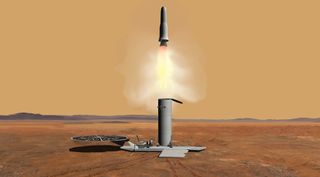NASA Continues Mars Sample Return Mission Studies

WASHINGTON — NASA doesn't expect to make decisions on how it will carry out a Mars sample return effort until late next year despite recent discoveries that have offered additional evidence that the planet was once, and may still be, habitable.
In results published in the journal Science last week, scientists working on data from the Curiosity Mars rover announced the discovery of organic molecules in ancient Martian rocks, as well as seasonal variations of methane concentrations in the Martian atmosphere.
While both discoveries are consistent with the existence of past or present life, they are alone not proof since both the organic molecules and methane gas production can be explained by alternative, non-biological processes. However, they have excited scientists who are seeking more data to determine the habitability of Mars. [Missions to Mars: A Robot Red Planet Invasion History (Infographic)]
"With these new findings, Mars is telling us to stay the course and keep searching for evidence of life," said Thomas Zurbuchen, NASA associate administrator for science, in a June 7 statement about the discoveries. "I'm confident that our ongoing and planned missions will unlock even more breathtaking discoveries on the red planet."
Among those planned missions is Mars sample return, a multi-mission architecture that involves collecting samples of Martian rock and regolith and caching them for collection by a later mission. That mission would then launch the samples into Martian orbit where a spacecraft would retrieve them and send them to Earth.
NASA's Mars 2020 rover will carry out the first phase of that effort by caching samples. Future steps remain undefined, although the agency's leadership says that Mars sample return remains a priority.
"Certainly, Mars sample return is something that we are committed to as an agency," said NASA Administrator Jim Bridenstine in a June 6 briefing with reporters. "That's a civilization-level changing capability, and we want to do it."
Get the Space.com Newsletter
Breaking space news, the latest updates on rocket launches, skywatching events and more!
In August 2017, Zurbuchen unveiled a concept for "lean" Mars sample return that minimized the amount of infrastructure needed for returning samples from Mars, such as additional orbiters that provided communications or reconnaissance services. It would also reduce the scientific instrumentation on the rover that picked up the cached samples and the spacecraft that collected the samples in orbit for return to Earth. The goal is to return samples to Earth by the late 2020s.
That basic concept remains under study, Zurbuchen said at a June 8 Space Transportation Association luncheon here. "Nobody has set the architecture," he said. "What we're doing is looking at a variety of options" that include participation by both international and commercial partners.
He noted that NASA's 2019 budget proposal included $50 million to support planning for Mars sample return efforts. That funding line remained flat for later years in the budget proposal, pending development of a more detailed mission architecture.
"We're going to give a lot more clarity about what that means exactly in the next budget cycle," he said. However, he didn't expect those plans to fall into place until late next year. "The first time we're really going to start tying up things, really making decisions because we have parallel joint investigations going on in Europe as well, is late '19. It's not a decision this week or next week or next month."
Both Bridenstine and Zurbuchen emphasized the importance of Mars sample return in that it can provide scientists hand-on access to samples that can be analyzed in laboratories far more sophisticated than can be included on any spacecraft to help determine if Mars had, or has, life.
"Who's the first to find life on another planet? Who's the first to find evidence there was life on another planet? That's why that's important," Bridenstine said. "We're committed to Mars sample return. If that can help us become the first to discover life on another planet, I think it's a great idea. I think it's something we ought to be doing."
This story was provided by SpaceNews, dedicated to covering all aspects of the space industry.
Join our Space Forums to keep talking space on the latest missions, night sky and more! And if you have a news tip, correction or comment, let us know at: community@space.com.

Jeff Foust is a Senior Staff Writer at SpaceNews, a space industry news magazine and website, where he writes about space policy, commercial spaceflight and other aerospace industry topics. Jeff has a Ph.D. in planetary sciences from the Massachusetts Institute of Technology and earned a bachelor's degree in geophysics and planetary science from the California Institute of Technology. You can see Jeff's latest projects by following him on Twitter.

